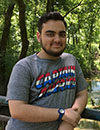Winter is just around the corner, and followers of several religious traditions are preparing to celebrate major holidays. While just about everyone in the entire world knows that Christmas is coming, fewer people are as knowledgeable about the other holidays. So grab some eggnog (or hot chocolate) and prepare to learn more about two other winter holidays coming our way.
First up is the Jewish tradition’s celebration of Hanukkah, which started yesterday. While you’ve probably heard of Hanukkah, do you know the history behind it?
Hanukkah celebrates the rededication of the Second Temple in Jerusalem in the second century B.C. At the time, the Greek-Syrian king, Antiochus IV, had outlawed the practice of the Jewish religion. In Jerusalem, the Greek-Syrian people were extremely oppressive of the Jewish people, desecrating the holy Temple and committing many crimes against the Jews. Though they were outnumbered, the Jewish people rose up in a revolt, led by Judah Maccabee. They ultimately prevailed and immediately got to work restoring the Temple.
One thing they had to do was to re-light the menorah, which is the golden candelabra that might come to mind when you think of Hanukkah. The menorah has nine candles, and they were supposed to be kept constantly lit in the Temple. The problem was that they had only enough oil to fuel the candles for one night, and it would take eight days to retrieve more. However, in what the Jewish people saw as a miracle, the candles managed to stay lit all eight nights, long enough for more oil to be retrieved. This is why Hanukkah is sometimes referred to as the “Festival of Lights.”
Hanukkah will be celebrated from December 10 to December 18. Every night over this eight-day period, Jewish families add a candle to their menorah and say prayers. The menorah is displayed in windows to remind passersby of the celebration. Families also share special foods that are fried in oil in a nod to the holiday’s origin.
A less-familiar winter holiday is the pagan festival of Yule. Yule is one of the oldest winter holidays, originating in the era of ancient Rome and the Celts. It is specifically tied to the winter solstice, when the shortest day of year occurs. The Ancient Romans saw this time as the world turned upside-down. They put up decorations, lit candles and exchanged presents, among other things. The Celts thought that the sun stood still during the 12 days of the Yule festival. They’d light fires to compensate for the missing sun, drink ale and tell campfire stories. Some Yule festival and Christmas traditions are intertwined, such as Yule logs.
This year, the Yule festival begins on Dec. 21 and will end on Jan. 1, 2021. Since modern neopaganism consists of such a large array of different sects, there isn’t any one way to celebrate Yule. Decorating houses in green, spending time around bonfires and exchanging gifts with family are just a few of the popular ways that different religious communities celebrate Yule today.
Whether it be Christmas, Hanukkah or Yule, the winter is a time of celebration for many religions. Even if you aren’t religious, consider getting in on some of the activities; learn about some crafts and ceremonies with Campus Ministries or check out some of the other great content on our Holiday Knights page! And if you find yourself at a bonfire with family or friends (physically distanced, of course), feel free to use what you’ve learned here to tell a good story or two.
Sources: Laura K. Kline and History.com.
Hello, I'm Bilal Qazi, and I am currently a Sophomore at Bellarmine
University. I am majoring in Communication with a minor in Anthropology.
I am trying figure out what I want to do with my degree. I have loved
my time at Bellarmine so far, and I hope the rest of my time here will
be as good as it has been. 